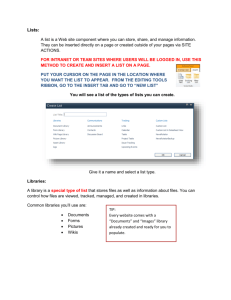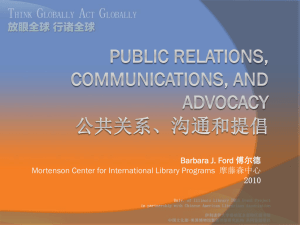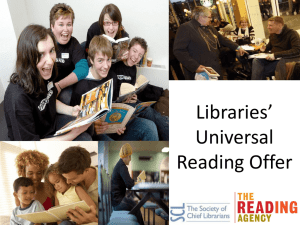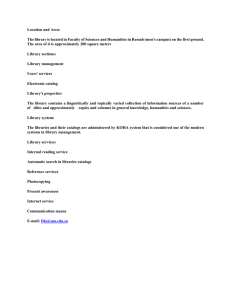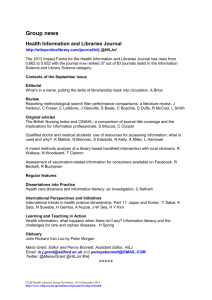LAI CILIP Ireland Conference Report Helen Kielt
advertisement
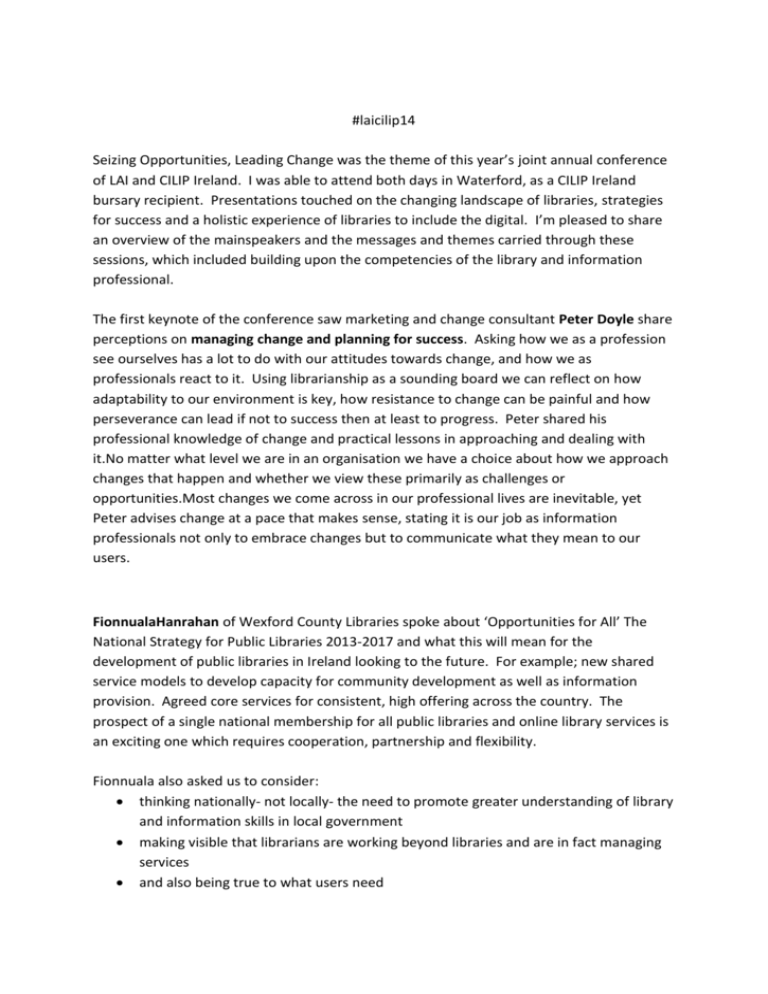
#laicilip14 Seizing Opportunities, Leading Change was the theme of this year’s joint annual conference of LAI and CILIP Ireland. I was able to attend both days in Waterford, as a CILIP Ireland bursary recipient. Presentations touched on the changing landscape of libraries, strategies for success and a holistic experience of libraries to include the digital. I’m pleased to share an overview of the mainspeakers and the messages and themes carried through these sessions, which included building upon the competencies of the library and information professional. The first keynote of the conference saw marketing and change consultant Peter Doyle share perceptions on managing change and planning for success. Asking how we as a profession see ourselves has a lot to do with our attitudes towards change, and how we as professionals react to it. Using librarianship as a sounding board we can reflect on how adaptability to our environment is key, how resistance to change can be painful and how perseverance can lead if not to success then at least to progress. Peter shared his professional knowledge of change and practical lessons in approaching and dealing with it.No matter what level we are in an organisation we have a choice about how we approach changes that happen and whether we view these primarily as challenges or opportunities.Most changes we come across in our professional lives are inevitable, yet Peter advises change at a pace that makes sense, stating it is our job as information professionals not only to embrace changes but to communicate what they mean to our users. FionnualaHanrahan of Wexford County Libraries spoke about ‘Opportunities for All’ The National Strategy for Public Libraries 2013-2017 and what this will mean for the development of public libraries in Ireland looking to the future. For example; new shared service models to develop capacity for community development as well as information provision. Agreed core services for consistent, high offering across the country. The prospect of a single national membership for all public libraries and online library services is an exciting one which requires cooperation, partnership and flexibility. Fionnuala also asked us to consider: thinking nationally- not locally- the need to promote greater understanding of library and information skills in local government making visible that librarians are working beyond libraries and are in fact managing services and also being true to what users need Rebecca Davies is Pro Vice-Chancellor at Aberystwyth University and another voice of encouragement for librarians to showcase their skills. She discussed approaches to personal and professional growth that is confident and competent.As Rebecca pointed out, working in a changing environment requires new skills and risk-taking requires agility. In a consumer-oriented culture we are urged towards a more entrepreneurial approach to librarianship. Rebecca shared some simple steps to follow for the aspiring entrepreneurial librarian- such as sharing experiences, demonstrating optimism and taking active steps towards continued professional development. Perhaps the fundamental point made by Rebecca was that libraries exist because they give people life-changing experiences. Later Rebecca led a workshop exploring library and information competencies. Asking what are the ‘iconic’ competencies of the librarian always brings varied discussion.Among the questions Rebecca asked was, ‘what is the least ‘librariany’ thing you do in your job?’ We heard examples from furniture wrangling to flood management to negotiating wedding licences. Behind this was the aim of encouraging people to tell their stories, pointing out that it’s up to us to reveal our competencies and translate what we do in smarter ways. And finding out how well matched traditional perceptions of ‘library’ are with the reality of working in one. Liz McGettigan who isDirector of Digital Library Experiences at SOLUS UK, delivered the keynote for day 2.One of the most inspiring things I heard during the conference was Liz pointing out that 5 years ago, her job title didn’t exist. This puts a different spin on the idea of future-proofing services and invites us to consider how we might also future-proof our skills for future roles.Liz spoke about the concept of the library as a ‘streetcorner university’ and highlighted this as an important vision for the future regeneration of libraries- utilising the library as a space for business, creativity and learning skills, both online and offline. Liz is an advocate for enabling dynamic services, stating she is ‘passionate about the future and how we deal with the potential demise of the paper book’. People don’t just want a service, they want a unique experience provided around a service- and libraries are best equipped to do this.And what will the landscape be for libraries in the future? As Liz saysnever has technology been so focused on accessing information. So we must focus on promoting the right things, in the right language, to the right people. Making the most of social media was an important theme within the conference, in particular the use of social media as another access point to the library. Maya Hanley spoke about this and why it can be useful for libraries to extend information out to users in this way. If a library is already a community of readers and writers, then for most engaging on facebook for example, will be a natural way to communicate with the library. Libraries are also thriving events hubs and people are interested in this, especially in the visual, so the right photographs and images can get a lot of positive engagement. A workshop dedicated to blogging for libraries discussed some of these ideas further, for example how blogs can be both a powerful tool to put your library on the map and a relatively low commitment way to try out new ideas. Whatever the motivation for being on twitter, facebook or blogging platforms, the nature of these seems to fit with the need for libraries be a medium for more than just static information and to encourage two-way communication with users. There were many high points of this conference- between session networking, workshop discussions, and meeting information professionals I had only previously known virtually, via twitter. Speakers were frank in voicing concerns of futureproofing for libraries- combining old buildings housing new technologies and the responsibility of creating services and spaces which serve multiple needs. I really enjoyed being part of a conference which heldso much interest for those absent as well as present. The engagement on social media shows that the themes of facing challenges and moving towards change are the concern of the many, not just the few. The enthusiasm of a range of delegates and engagement of onlookers can also be seen in the catalogue of tweets filed under #laicilip14.



